Special Features
A look into the culture, language, traditions of Tiv tribe in Nigeria
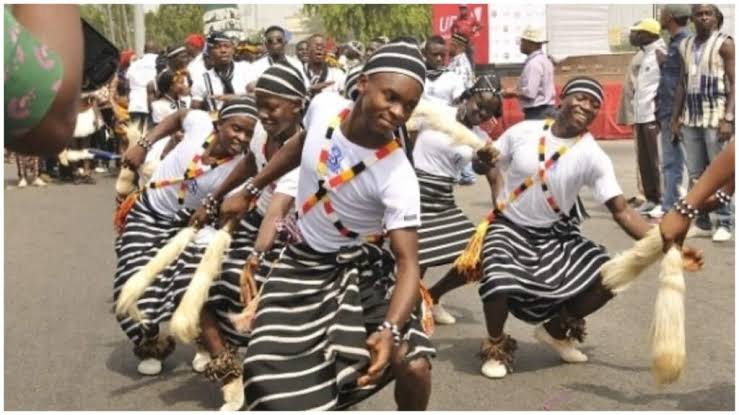
In this post, news360 Nigeria delves into the culture, traditions, beliefs of the Tiv tribe in Nigeria.
The Tiv ethnic group stands out as one of the largest and most prominent ethnic communities in Nigeria.
Primarily located in the Middle Belt region, they reside mostly in Benue, Taraba, and Nasarawa states. Their presence is also felt in parts of Plateau and Cross River states.
The Tiv people are known for their rich cultural heritage, which is characterized by unique language, traditions, beliefs, dressing, food, and occupational practices.
Their society revolves around strong agricultural roots, with strong values of kinship, community, and spirituality.
Origin
The origin of the Tiv people is traced back to the Bantu migrations that occurred thousands of years ago.
According to Tiv oral traditions, their ancestors migrated from the southern regions of Africa, particularly around present-day Cameroon.
The Tiv themselves refer to their early ancestors as Ikyurav-Tiv’. The leader of the early Tiv people, Tiv, from whom the group gets its name, is believed to have settled in the Benue Valley, where the majority of the population resides today.
The Tiv migrated along the Benue River and gradually spread to different parts of Nigeria’s Middle Belt.
Language
The Tiv people speak the Tiv language, which belongs to the Southern Bantoid subgroup of the Benue-Congo language family.
The language is rich in proverbs and idiomatic expressions, used extensively in everyday communication and traditional rituals.
In Tiv society, language serves as a vehicle for the transmission of cultural values and identity.
Despite the increasing influence of English and other Nigerian languages, Tiv remains the primary medium of communication within the community.
Occupation
The Tiv people are known for their agricultural expertise, which remains the primary occupation of the majority of the population.
Their agricultural activities are centered on subsistence farming, with crops such as yam, maize, cassava, rice, millet, and beans being the main produce.
Additionally, the Tiv cultivate cash crops like sesame, soya beans, and groundnuts, which are sold in local and international markets.
Livestock farming is another significant aspect of Tiv occupation. Cattle, goats, and poultry are commonly raised in Tiv communities, both for personal consumption and trade.
Fishing, particularly along the Benue River, also provides a source of livelihood for many Tiv families.
In recent years, many Tiv people have migrated to urban centers in search of employment in government, education, and private enterprises. However, the majority still engage in farming and rural-based occupations.
Traditions and social structure
Tiv society is largely patriarchal, with social organization based on kinship and lineage.
The traditional social structure is organized around extended families and clans, known as ‘tar’. These clans play a significant role in the governance and administration of Tiv communities.
Leadership within the clans is typically based on age and wisdom, with elders holding significant authority over communal matters.
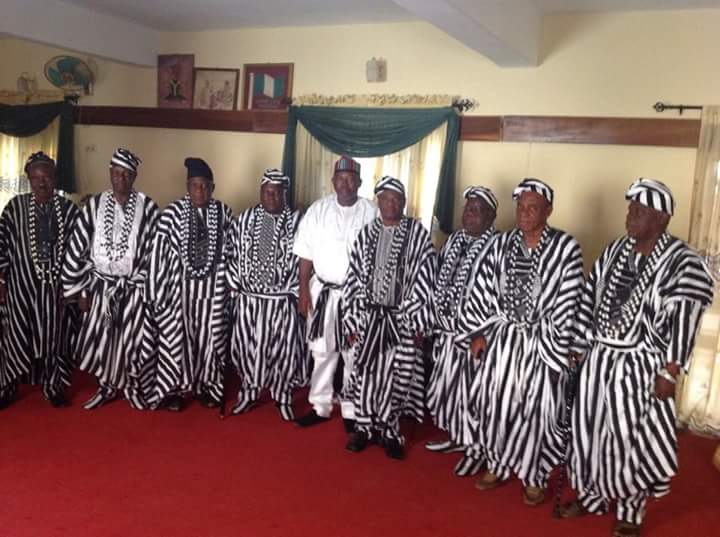
A group of Tiv elders
Marriage
In Tiv culture, marriage is highly valued and involves elaborate traditional rituals. One key aspect is the exchange of bridewealth, known as ‘kem kwase’, paid by the groom’s family to the bride’s family.
The process of marriage is not just a union of two individuals but a bond between families and lineages.
Dancing and music
These are essential parts of Tiv cultural expression. The most famous Tiv dance is the ‘Swange’, characterized by rhythmic body movements and graceful steps performed during festive occasions.
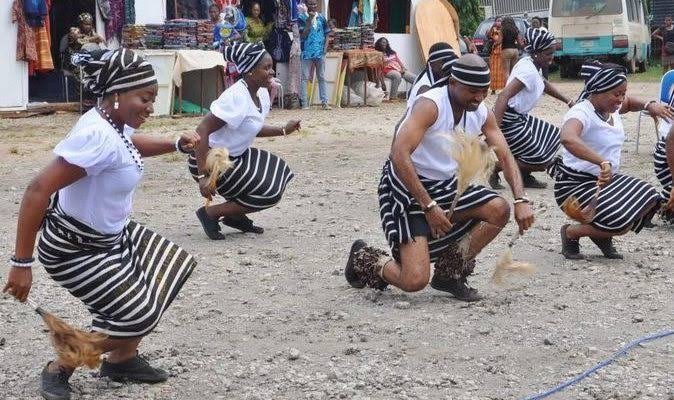
Music and drumming are integral to Tiv ceremonies, such as marriages, harvest celebrations, and religious rituals.
Beliefs
The traditional belief system of the Tiv people revolves around ancestor worship and animism, with reverence for deities associated with nature and the environment.
The Tiv believe in ‘Aondo’, a supreme god who controls the universe and is responsible for creation.
Additionally, they acknowledge other spiritual forces, including the spirits of ancestors, who are believed to influence the living.
In modern times, a significant number of Tiv people have adopted Christianity, particularly Catholicism and Protestantism.
Nevertheless, traditional religious practices and beliefs still persist, often blending with Christian practices in unique ways. For instance, many Tiv people continue to observe traditional rituals, such as ‘yangev’, a form of spiritual divination used to communicate with ancestors or consult spiritual forces on important matters.
Dressing
Tiv traditional attire is distinctive and easily recognizable. The people are known for their signature black and white striped fabric known as ‘anger’ or ‘ivav’.
This cloth is handwoven and worn on special occasions such as festivals, weddings, and funerals. The ‘anger’ is usually worn as a wraparound or fashioned into robes for men and skirts or blouses for women.
The fabric symbolizes the unity and identity of the Tiv people and has become a source of pride among the group.
Men typically wear the ‘anger’ alongside a matching cap, while women wear it as a skirt or wrapper paired with a blouse.
The Tiv’s traditional attire is not just for show; it carries deep cultural significance, symbolizing peace, harmony, and the communal spirit of the Tiv people.
Cuisine
The Tiv people are predominantly farmers, and their diet reflects the agricultural abundance of the Benue Valley, often referred to as the “food basket of Nigeria.”
The staple food of the Tiv is pounded yam, which is usually served with a variety of soups.
The most common soup among the Tiv is gbegiri, made from ground beans, and pepe soup, a spicy broth usually made with meat or fish.
Another popular dish is ‘akpu’, a type of fermented cassava dish, and tuwo, a meal made from maize or millet.
The Tiv also enjoy various types of vegetables and grains, such as rice and millet. The cuisine is hearty and rich in flavors, often spiced with locally grown peppers and herbs.
Festivals
The Tiv people celebrate a variety of festivals that highlight their rich agricultural and cultural heritage.
One of the most significant is the ‘Kwagh-Hir’festival, a traditional puppet theater performance that portrays historical and mythical events in Tiv culture.
This festival is an important medium for passing down folklore, moral lessons, and cultural values from one generation to the next.
Another major celebration is the ‘Yam Festival’, which marks the beginning of the harvest season.
The festival is a time of communal feasting, dance, and thanksgiving for a bountiful harvest. It is also an occasion for the Tiv people to renew their bonds with their ancestors and seek blessings for the next planting season.


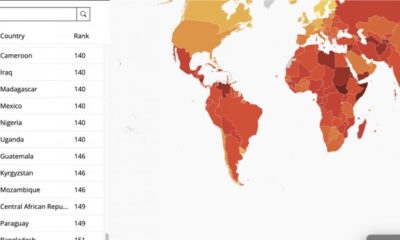





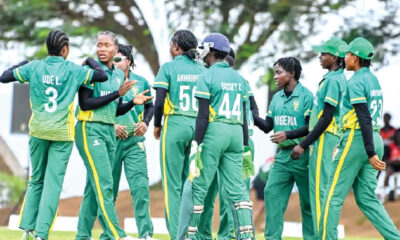



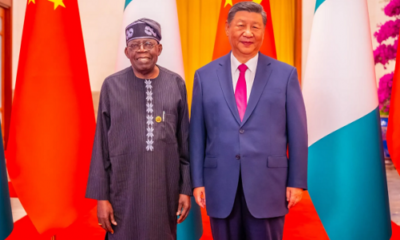





















Sonter Kyer
September 17, 2024 at 8:17 am
Brief but informative . thanks to the authors.